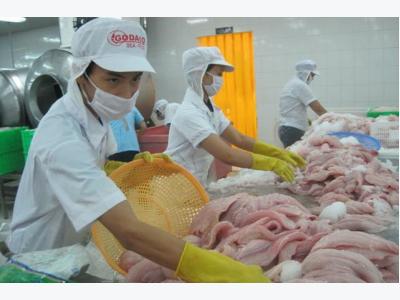Tra fish exports not greatly affected by Carrefour

Concerning Carrefour’s decision to stop selling Vietnamese tra fish (pangasius) in some of their markets, the Vietnam Association of Seafood Exporters and Producers (VASEP) said the export of the fish to Europe may be affected but not seriously.
Talking to the Daily, VASEP General Secretary Truong Dinh Hoe said that after a Spanish TV station had aired video footage containing false information about the domestic tra fish industry, a group of people made use of this to broadcast propaganda against Vietnam’s tra fish.
“A certain group of people seeks to take advantage of this environmental incident to inflate the story and assist the sale of domestic fish, instead of imports from Vietnam,” he said.
What was reflected in the footage does not represent Vietnam’s tra fish industry. It is not the standard process of tra fish production, but just a phenomenon that has been exaggerated to defame the pangasius fish industry of Vietnam, Hoe said.
Following this incident, Carrefour, Europe’s largest retailer, said they would stop selling Vietnamese tra fish, although they had been selling just a small quantity of this item.
“It is unknown how much they sell a year since they do not buy directly from us but through importers. However, the information from a number of importers shows that the percentage of tra fish sold by Carrefour is negligible,” Hoe said.
Nevertheless, the consumption of Vietnamese tra fish may go down due to this case, but the impact will not be serious, as production activities at home still meet the environmental and food safety requirements.
“Vietnam still offers Europe the products that meet all the conditions of this market such as ASC (the world’s leading certification and labeling program for responsibly farmed seafood), Global GAP (good agricultural practices)...,” he remarked.
The Global Aquaculture Alliance (GAA) has affirmed Vietnamese tra fish is produced responsibly according to the stringent food safety standards, so consumers can totally rest assured, said Vo Thi Thu Huong, deputy general secretary of the Vietnam Pangasius Association (VN Pangasius).
On fis.com, Simon Bush, professor of environmental policy at Wageningen University, said: “Our analysis shows that the vigorous claims made about pangasius do not match the very limited safety risk and limited environmental impact observed in scientific studies.”
Meanwhile, Ghent University Professor Emeritus Patrick Sorgeloos stressed research of Dutch scientists showed that the contribution of the pangasius industry to pollution in the Mekong River is negligible.
GAA’s BAP Coordinator Dan Lee pointed out that any fish species, whether in a natural or a farm setting, will interact with its environment. Pangasius is no exception and the interactions arising from production systems in Southeast Asia do have the potential to generate localized negative impacts.
Hoe of VASEP believed the libelous behavior as described above serves none other than the purpose of trade protection and unfair competition. Therefore, the local tra fish industry must further improve their quality, pursue sustainable farming and provide more products meeting international standards so that consumers may feel more confident.
Có thể bạn quan tâm
 Australia relaxes ban on shrimp import
Australia relaxes ban on shrimp import The Australian Department of Agriculture and Water Resources on February 6 announced a relaxation of the ban on importing shrimp
 Mekong Delta tra fish moguls go bust
Mekong Delta tra fish moguls go bust Many fish processing companies in the Mekong Delta region have gone bankrupt, owing banks and farmers billions of VND.
 “King of pangasius” suffers unexpected loss
“King of pangasius” suffers unexpected loss Differences between audited and unaudited financial statements areunavoidable, however, a difference of up to trillions of VND caught Hung Vuong Joint Stock